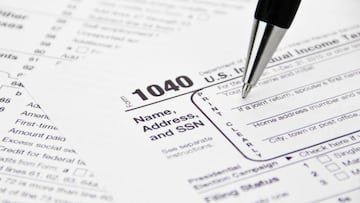Tax Filing 2021: do stimulus checks and unemployment benefits count as an income?
Tax filers have a lot to contend with this year regarding the various programs put into place due to the pandemic and how they will affect their tax return.

As the covid-19 pandemic began to take its toll on the US economy Congress passed the CARES Act to stop its collapse. Part of the relief package included federally funded expanded jobless benefits and the first round of stimulus checks, or Economic Impact Payment (EIP). Since then, the unemployment programs have been extended and a second round of stimulus checks were sent out. Many are wondering if they will be taxed on that income when they file.
Stimulus checks are not taxable income
The stimulus checks are a tax rebate on a tax filer's 2020 income-tax filing and is not includible in your adjusted gross income (AGI), thus they are not taxable. The payments also will not affect your income for purposes of determining eligibility for federal government assistance or benefit programs.
However filers will want to know if they have received the full amount they are due since the IRS used either taxpayers 2018 or 2019 income-tax filing to judge how much each individual or household would receive. During 2020 many Americans saw their finances change drastically compared with the last time they filed with the IRS.
#IRSDirectDeposit is simple, safe and secure. And you can get your refund deposited into one, two or three different accounts, if you’d like. https://t.co/8dF7SHWYze pic.twitter.com/oFqUJNiOnq
— IRSnews (@IRSnews) February 17, 2021
What if I didn’t receive the full amount due?
You will need the Notice 1444 you received regarding your Economic Impact Payment (EIP), or payments since there were two, when preparing your 2020 tax records. If you did not receive a payment from either EIP-1 or EIP-2, or did not receive the maximum amount, you may be eligible to claim the Recovery Rebate Credit when you file your 2020 tax return, which you can find on Line 30 of the 1040 and 1040-SR forms.
On the other hand if you were fortunate enough to have seen your finances improve during the pandemic making you ineligible for the $1200 and $600 stimulus checks you needn’t worry. There was no provision in the law for those who received a direct payment to pay back all or part of the payment if they no longer qualify for that amount or would qualify for a lesser amount.
- Unemployment benefits: what is the Democratic proposal in the latest relief bill?
- How to claim New York unemployment benefits
- How to claim New Jersey unemployment benefits
- Taxes 2021: when to expect rebate to arrive
Unemployment benefits are taxable income
Unemployment benefits are considered income along with wages, salaries, and bank interest. You will need to include them as part of your total income when you file your taxes. State unemployment divisions issue an IRS Form 1099-G for those who have received unemployment insurance during the year, including those received through the federal programs created during the pandemic but administered through the state unemployment agencies.
Individuals must report their unemployment compensation on Schedule 1 of your federal tax return in the Additional Income section. The amount will be carried to the main Form 1040. Remember to keep all of your forms, including any 1099-G form you receive, with your tax records.
Unemployment compensation must be reported on your #IRS tax return. Learn more at https://t.co/lHsbyA2bvu pic.twitter.com/e1smUqOVPg
— IRSnews (@IRSnews) February 17, 2021
How do I file my taxes?
The IRS recommends filing your taxes electronically and using direct deposit to get a faster return. When you file your income-tax filing could affect how much you receive back from the government if you are expecting a return, and may well change the amount that you receive in a new round of direct payments.
Congress is currently pushing through legislation which includes a third stimulus check this time for $1400. Part of the new covid-19 relief bill contemplates expanded Earn Income Credit and Child Tax Credit, the latter could see families receiving up to $300 per child per month.
- Tax filing 2021: how can I track my tax return?
- Tax returns will decide your stimulus check entitlement
- How to get third stimulus check as fast as possible
- Tax Filing 2021: How to file an amended Tax Return
What is "IRS Free File?"
The IRS Free File Program provides two ways for taxpayers to prepare and file their federal income tax online for free:
Related stories
Traditional IRS Free File provides free online tax preparation and filing options on IRS partner sites. IRS partners are online tax preparation companies that develop and deliver this service at no cost to qualifying taxpayers. Please note, only taxpayers whose AGI is $72,000 or less qualify for any IRS Free File partner offers.
Free File Fillable Forms are electronic federal tax forms you can fill out and file online for free. If you choose this option, you should know how to prepare your own tax return. Please note, it is the only IRS Free File option available for taxpayers whose AGI is greater than $72,000.
#IRS urges you to ask your tax preparer to e-file your return. This will prevent delays in processing. Learn more at: https://t.co/zTn0Q2F6Ck pic.twitter.com/iEOnPEUI8f
— IRSnews (@IRSnews) February 15, 2021


